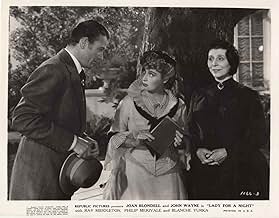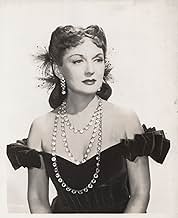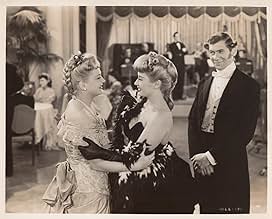Füge eine Handlung in deiner Sprache hinzuGambling boat operator Jenny Blake throws over her gambler beau Jack Morgan in order to marry into high society.Gambling boat operator Jenny Blake throws over her gambler beau Jack Morgan in order to marry into high society.Gambling boat operator Jenny Blake throws over her gambler beau Jack Morgan in order to marry into high society.
- Regie
- Drehbuch
- Hauptbesetzung
Hall Johnson Choir
- Singers
- (as The Hall Johnson Choir)
Fred Aldrich
- Member of Quartet
- (Nicht genannt)
Empfohlene Bewertungen
OK, it wasn't an Academy Award winner. However, it did have many good elements to it. I'm not going to waste time telling you what it was about, you can read that in other comments. John Wayne was young and good looking, standing straight and tall. John Blondell was young and pretty. I remembered her in later movies after she had gotten older and a little heavier. Old man time sure beats the heck out of all of us.
Some people will raise and eyebrow at the plantation type scenes with the blacks dancing and singing. Did that go on? I don't know, but I wouldn't be surprised that after hard work in the fields, ANY people would be happy for the party time. Hattie Noel played the maid (Chloe) of Joan Blondell (Jenny). Chloe was funny and did an energetic job. Were these type parts demeaning for Blacks? Sure. But the way to look at it, is that it was the beginning of getting the foot in the door to show what you could do. There was a lot of talent in that singing and dancing. Nothing to be ashamed of, many a White person has played a demeaning part. The main thing is to showcase your talent. Hattie Noel may not have had the good fortune to be in Gone With The Wind, but she would have done quite nicely.
The best acting came from Edith Barrett who played the kinder Alderson sister Katherine. Some might call it overacting but I don't think that to be the case. You could feel her anguish between being torn by family loyalty, fear of her sister and doing the right thing. She gave a terrorized, impassioned performance.
Also enjoyable was John Blondell's singing performances as the part owner of the riverboat. In fact, she was so good that I wondered if a professional singer had dubbed her voice, even though I was aware of her own musical talents.
Blanche Yurka played the evil sister Julia, and how she could ooze evilness, with those eyes boring into anyone who crossed her. She hadn't changed much from her earlier days as Madame Defarge in A Tale of Two Cities.
Leonid Kinskey played John Wayne's bodyguard. Although Mr. Kinskey was always a good character actor (remember him as the funny bartender in Casablanca?), the reason for the part in the movie escapes me. I guess John Wayne needed a sidekick.
The rest of the cast was adequate, but nothing noteworthy that I can remember. Except of course for the can-can girls who really knew how to dance that thing with plenty of spirit.
OK, should you see it? If you have the movie or see it coming on the late show, no reason not to. The story is predicable and acting is adequate with a few who stand out as mentioned above. Don't watch it just to see John Wayne because the Duke was just being the Duke. And although the Duke is almost always fun to watch, this role didn't give him much room to do his thing. His part was overshadowed by larger parts going to Joan Blondell and the Alderson sisters. However, if you have the time, you will be entertained by a movie that is "not too bad" and "fairly enjoyable". There are some good acting parts and the singing and dancing routines are quite good too. I do not think you will be disappointed.
Some people will raise and eyebrow at the plantation type scenes with the blacks dancing and singing. Did that go on? I don't know, but I wouldn't be surprised that after hard work in the fields, ANY people would be happy for the party time. Hattie Noel played the maid (Chloe) of Joan Blondell (Jenny). Chloe was funny and did an energetic job. Were these type parts demeaning for Blacks? Sure. But the way to look at it, is that it was the beginning of getting the foot in the door to show what you could do. There was a lot of talent in that singing and dancing. Nothing to be ashamed of, many a White person has played a demeaning part. The main thing is to showcase your talent. Hattie Noel may not have had the good fortune to be in Gone With The Wind, but she would have done quite nicely.
The best acting came from Edith Barrett who played the kinder Alderson sister Katherine. Some might call it overacting but I don't think that to be the case. You could feel her anguish between being torn by family loyalty, fear of her sister and doing the right thing. She gave a terrorized, impassioned performance.
Also enjoyable was John Blondell's singing performances as the part owner of the riverboat. In fact, she was so good that I wondered if a professional singer had dubbed her voice, even though I was aware of her own musical talents.
Blanche Yurka played the evil sister Julia, and how she could ooze evilness, with those eyes boring into anyone who crossed her. She hadn't changed much from her earlier days as Madame Defarge in A Tale of Two Cities.
Leonid Kinskey played John Wayne's bodyguard. Although Mr. Kinskey was always a good character actor (remember him as the funny bartender in Casablanca?), the reason for the part in the movie escapes me. I guess John Wayne needed a sidekick.
The rest of the cast was adequate, but nothing noteworthy that I can remember. Except of course for the can-can girls who really knew how to dance that thing with plenty of spirit.
OK, should you see it? If you have the movie or see it coming on the late show, no reason not to. The story is predicable and acting is adequate with a few who stand out as mentioned above. Don't watch it just to see John Wayne because the Duke was just being the Duke. And although the Duke is almost always fun to watch, this role didn't give him much room to do his thing. His part was overshadowed by larger parts going to Joan Blondell and the Alderson sisters. However, if you have the time, you will be entertained by a movie that is "not too bad" and "fairly enjoyable". There are some good acting parts and the singing and dancing routines are quite good too. I do not think you will be disappointed.
The prior review was excellent. But the movie is set in Memphis not New Orleans, even though the Mardi Gras opening would belie that. And Joan Blondell's character is the one who proposes the marriage, not the other way around. All in all, it's very entertaining movie which deserves a better reputation.
Joan Blondell delivers something of a feisty Stanwyck-style character in her depiction of successful river boat owner "Jenny". Together with her local kingpin co-partner "Jackson" (John Wayne) they make a good living from the great and the good of Tennessee society. The thing is, though, "Jenny" has ambitions to join that society. She craves respectability and when an opportunity to marry into the "Alderson" family presents itself, she doesn't think twice. Her new husband "Alan" (Ray Middleton) is a bit of a drunk, but his family need her money so unwillingly tolerate her. All except, "Julia" (Blanche Yurka) who really does look down her nose at her new in-law. The more "Jenny" tries, the more cleverly antagonistic her nemesis becomes until finally murder ensues and the truth must out... It's a bit of an amalgam of stories this, and the really rather wooden Wayne features too sparingly to make much difference to the rather meandering drama. Hattie Noel has some fun as "Chloe" and there's a bit of toe-tapping mid way through but the rest of this is all just a little procedural with an expected twist right at the denouement. It's a good looking tale of rancour, envy, love and bitterness - but told in fashion you're not really likely to remember.
While I like both Joan Blondell and John Wayne, that wasn't enough for me to give this movie a higher rating. The costumes were gorgeous, and I loved the settings (the late 1860's had a certain visual charm), but the story left a lot to be desired.
The premise was good: casino owner Jenny Blake (Joan) wants to escape her lower class background and gain respectability, so she forsakes her boyfriend, Jack Morgan (John) and marries into the socially prominent but financially deficient Alderson family, trading her money for Alan Alderson's name and social connections. She soon finds out she didn't get the best of the bargain, as Alan's an alcoholic, and his family consists of his snobbish, angry father, his sour faced, domineering Aunt Julia, and his mentally vague (though kindly) Aunt Katherine. Jenny's not welcomed, made to feel like an outcast, and kept away from the very people she wanted to impress. She also senses there's more going on in this peculiar family than anyone will admit, though she gets some cryptic hints from Katherine.
Where the movie fails, is in its inability to make up its mind whether to be a musical (there are several numbers performed on the riverboat casino and at the Alderson mansion), a romance, a mystery or a gothic horror story. By trying to be a little of each, it accomplished even less. I guess you could call this a jack-of-all-trades-master-of-none movie.
It has its saving graces. The musical numbers were good, and there was an exciting chase scene, as Jack races to save Jenny, when she loses control of her carriage, unaware of the horses's impaired vision. There were a couple of black servants (Hattie Noel and Lew Payton) who gave the story some comic moments.
Not a bad movie, but it could have been better.
The premise was good: casino owner Jenny Blake (Joan) wants to escape her lower class background and gain respectability, so she forsakes her boyfriend, Jack Morgan (John) and marries into the socially prominent but financially deficient Alderson family, trading her money for Alan Alderson's name and social connections. She soon finds out she didn't get the best of the bargain, as Alan's an alcoholic, and his family consists of his snobbish, angry father, his sour faced, domineering Aunt Julia, and his mentally vague (though kindly) Aunt Katherine. Jenny's not welcomed, made to feel like an outcast, and kept away from the very people she wanted to impress. She also senses there's more going on in this peculiar family than anyone will admit, though she gets some cryptic hints from Katherine.
Where the movie fails, is in its inability to make up its mind whether to be a musical (there are several numbers performed on the riverboat casino and at the Alderson mansion), a romance, a mystery or a gothic horror story. By trying to be a little of each, it accomplished even less. I guess you could call this a jack-of-all-trades-master-of-none movie.
It has its saving graces. The musical numbers were good, and there was an exciting chase scene, as Jack races to save Jenny, when she loses control of her carriage, unaware of the horses's impaired vision. There were a couple of black servants (Hattie Noel and Lew Payton) who gave the story some comic moments.
Not a bad movie, but it could have been better.
Jenny Blake runs the gambling boat Memphis Belle, but she yearns to be accepted by the high society. Casting off her love interest Jack Morgan, Jenny accepts an offer of marriage from non compos mentis plantation owner Alan Aldredge. Naturally the rest of the Aldredge family are not too thrilled to have someone of Jenny's standing in their family, with one of them in particular prepared to do anything to get rid of Jenny.
Serviceable time filler is a phrase that could have been invented for this particular film. It's neither good or bad, and it's competently put together from both sides of the camera. Tho primarily a romantic drama, there is often humour within the script, most often when John Wayne {Jack} and Joan Blondell {Jenny} are sharing the screen together. Tho for sure not during the big finale court room pay off!! Here is the main problem on why Lady for a Night really falls down, it's confused as to what it should be. It's joviality is nice and endearing, but when the theme of class snobbery is coming to the fore, light relief is neither warranted or required. In fact the shift in tone for the rushed final quarter takes all by surprise. We lurch from grinning with mirth one second to a serious drama the next, and it's all a bit off putting at a time when the nastiness of the story deserves our full attention.
The cast are a mixed bunch. Blondell is effervescent and attractive, and Wayne, in a straight uncomplicated role, does what is needed with such minimalistic material. Blanche Yurka does a nice line in evil old bat routine {paging Mrs Danvers, paging Mrs Danvers} and Hattie Noel dons the maid apron and gives it the Hattie McDaniel treatment. The rest are barely worth a mention, with Ray Middleton & Philip Merivale particularly out of their depth. Some nice tunes such as "Ta-ra-ra Boom-der-é" and "Has Anybody Seen My Man?" lighten up proceedings {again is this a dark film or not?} and the costume side of production is well worth observation. But it all ends up being a collage of tones, with neither one or the other breaking out to let the good side of the film truly break free of the confusion, shame that. 4/10
Serviceable time filler is a phrase that could have been invented for this particular film. It's neither good or bad, and it's competently put together from both sides of the camera. Tho primarily a romantic drama, there is often humour within the script, most often when John Wayne {Jack} and Joan Blondell {Jenny} are sharing the screen together. Tho for sure not during the big finale court room pay off!! Here is the main problem on why Lady for a Night really falls down, it's confused as to what it should be. It's joviality is nice and endearing, but when the theme of class snobbery is coming to the fore, light relief is neither warranted or required. In fact the shift in tone for the rushed final quarter takes all by surprise. We lurch from grinning with mirth one second to a serious drama the next, and it's all a bit off putting at a time when the nastiness of the story deserves our full attention.
The cast are a mixed bunch. Blondell is effervescent and attractive, and Wayne, in a straight uncomplicated role, does what is needed with such minimalistic material. Blanche Yurka does a nice line in evil old bat routine {paging Mrs Danvers, paging Mrs Danvers} and Hattie Noel dons the maid apron and gives it the Hattie McDaniel treatment. The rest are barely worth a mention, with Ray Middleton & Philip Merivale particularly out of their depth. Some nice tunes such as "Ta-ra-ra Boom-der-é" and "Has Anybody Seen My Man?" lighten up proceedings {again is this a dark film or not?} and the costume side of production is well worth observation. But it all ends up being a collage of tones, with neither one or the other breaking out to let the good side of the film truly break free of the confusion, shame that. 4/10
Wusstest du schon
- WissenswertesThis film inspired the name of one of the most famous World War 2 bombers, the B-17 "Memphis Belle", one of the first to complete a full combat tour of 25 missions against targets in Nazi Germany in May 1943. The aircraft was the namesake of pilot Captain Robert K. Morgan's sweetheart, Margaret Polk, a resident of Memphis, Tennessee. Morgan originally intended to call the B-17, Little One, after his pet name for her, but after Morgan and his co-pilot, Jim Verinis, saw this movie in which the leading character owns a riverboat named the Memphis Belle, he proposed that name to his crew. After their combat service, the Belle and her crew were sent home on highly successful war bond tour. They were also featured in an award-winning 1944 documentary by William Wyler.
- Crazy CreditsUnderneath the credits, there is some footage of extras dancing in front of the Alderson family's house.
- SoundtracksUp in a Balloon
(uncredited)
Written by Henry B. Farnie (1868)
Special Lyrics by Sol Meyer
Sung by Joan Blondell, a quartet and chorus on the Memphis Belle
Whistled by John Wayne
Played as backgroung music often
Top-Auswahl
Melde dich zum Bewerten an und greife auf die Watchlist für personalisierte Empfehlungen zu.
- How long is Lady for a Night?Powered by Alexa
Details
- Laufzeit1 Stunde 27 Minuten
- Farbe
- Seitenverhältnis
- 1.37 : 1
Zu dieser Seite beitragen
Bearbeitung vorschlagen oder fehlenden Inhalt hinzufügen

Oberste Lücke
By what name was Lady for a Night (1942) officially released in India in English?
Antwort



































